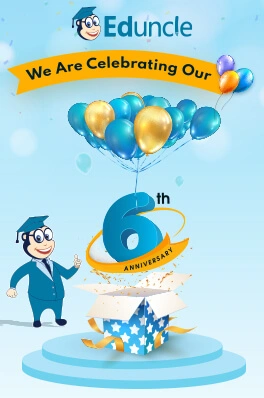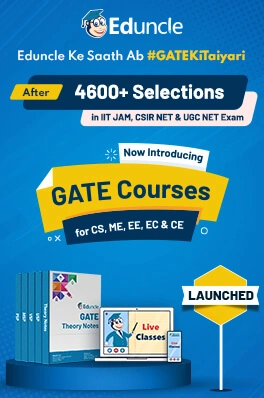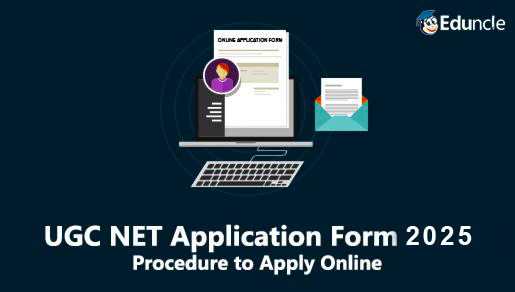UGC NET Paper-I is the key to success in the National Eligibility Test. It helps to get a splendid result.
To boost up the overall marks in UGC NET, it's important to have complete knowledge about all the important topics of UGC NET Paper I.
After analyzing the previous year question papers, we found some most important topics on which you must have good command.
The Higher Education System is one of those topics from which questions are asked most. To get expertise in this topic, you will require a deep understanding of Higher Education Bodies in India, their structure, mission & vision.
So, here, we have come up with some fruitful notes of Higher Education Apex Bodies with their brief information to help you prepare well for UGC NET Paper I.
What Are Higher Education Bodies in India and Their Functions?
List of Higher Education Body in India
Download Free UGC NET Paper 1 Mock Test Papers 2022
What Are Higher Education Bodies in India and Their Functions?
Based on the UGC NET Syllabus for Paper 1, the Higher Education Bodies is one of the most crucial topics that hold good scores in the question paper.
Before moving on further, you should look over the important aspect behind involving the Higher Education Bodies in the Indian Education System.
There is a famous saying ‘Necessity is the mother of invention’. This saying perfectly fits the nature of our Higher Education System.
These bodies were regulated to make the smooth functioning of the Indian education system to build a modern and civilized society to such a vast population of India.
This was the challenge which is finally achieved by the Indian Government by regulating the Higher Education Bodies.
You can check the important functions of various apex bodies by scrolling down the blog.
Important Functions of the Apex (Higher Education) Bodies of India
Take a quick view on the functions of Higher Educational Bodies as most of the time questions are asked in UGC NET Exam Paper I repeatedly.
Conducting various entrance tests and examinations.
In the training of professionals, the work of apex bodies is regulating the level of examinations.
To maintain the standards of the uniform of education fields in India.
Regulating the examination level.
Monitoring, evaluating and funding in priority areas.
Aiding in development, research, and Carrying adjustment of training courses for professionals.
Maintaining parity of awards & certifications.
Below you can check the complete information about the most important Higher Education Body in India.
List of Higher Education Body in India
To make it easy for the aspirants of UGC NET, we have listed here the most important Higher Education Bodies from where questions are mostly asked in UGC NET Paper I.
This topic is a little vast so, if you want to complete this topic to get good marks in UGC NET, then start preparing earlier for it.
Scroll down gradually and get detailed information about Higher Education Bodies.
Here are the quick links to check all the Higher Education Bodies in India.
University Grants Commission (UGC)
Central Board of Secondary Education (CBSE)
Council of Scientific and Industrial Research (CSIR)
National Council of Educational Research and Training (NCERT)
National Institute of Open Schooling (NIOS)
Council of Indian School Certificate Examination (CISCE)
Council of Technical Education (AICTE)
Council for Agriculture Research (ICAR)
All India Management Association (AIMA)
Central Institute of Educational Technology (CIET)
Central Hindi Directorate (CHD)
Central Institute of India Languages (CIIL)
Central Institute of English and Foreign Languages (CIEFL)
Let’s start it.
University Grants Commission (UGC)
The government of India has set the statutory body named ‘University Grants Commission’ under the Ministry of Human Resource Development (MHRD).
The main aim to establish this Higher Education Body is to maintain the standard of higher education with coordination and determination.
Following are other functions of UGC –
Providing recognition certificate to the various universities of India.
Distributing funds to UGC Recognised Universities and colleges.
Helping NTA to conduct the UGC NET and CSIR NET Exams to select the deserving candidates for the post of lecturers and researchers.
To promote and coordinate university education.
You can get the detailed information about UGC NET & CSIR NET Exam from here –
Following are the contact details of UGC:
E-mail ID – webmaster.ugc.help@gmail.com
Contact No. – 011-23604446, 011-23604200
Address – University Grants Commission (UGC) Bahadur Shah Zafar Marg. New Delhi - 110002
Central Board of Secondary Education (CBSE)
It is a national level board of education in India which is controlled by the Union Government of India for public and private schools.
Approximately 19527 schools are affiliated to the Central Board of Secondary Education in wherein 211 schools are in foreign.
Apart from final Exams for Class 10 and Class 12, CBSE also conducted the NEET, JEE Main, UGC NET Exams but as per the new rules, NTA Replaces CBSE.
The aim of the CBSE Board is to achieve academic excellence by conceptualizing policies and their operational planning to ensure balanced academic activities in the schools affiliated to the Board.
If you want more information about CBSE, then you can contact them through the below-mentioned details -
E-mail ID – info.cbse@gov.in
Inquiry – 011-22509256, 22509257
Council of Scientific and Industrial Research (CSIR)
The Council of Scientific and Industrial Research is one of the most famous Higher Education Body or organizations which is known for its cutting-edge R&D knowledgebase in diverse S&T areas.
It was established in September of 1942 as an autonomous body and emerged as the largest research and development organization in India.
The question can be asked in UGC NET Paper I about the CSIR Achievements and vision. Below you can check the vision of CSIR –
“Purse science which strives for global impact, a technology that enables innovation-driven industry and nurtures trans-disciplinary leadership thereby catalyzing inclusive economic development for the people of India”.
CSIR built by Dr Bhatnagar to meet the challenges of that time and it is 65-year-old now.
National Testing Agency (NTA)
It is one of the most important Higher Education Bodies as per the viewpoint of UGC NET Exam because it’s a newly emerged body and has taken the responsibilities of conducting the National Eligibility Test too.
NTA has been established as a premier, specialist, autonomous and self-sustained testing organization to conduct the entrance examinations for admission in higher educational institutions.
Mission –
NTA has established to improve equality and quality in the education system of India by administering research-based reliable, efficient, reliable, transparent, fair and international level assessments.
Following are the Important Functions of National Testing Agency –
To identify partner institutions with adequate infrastructure from the existing schools and higher education institutions, which would facilitate the conduct of online examinations – UGC NET, CSIR NET, NEET &JEE Main without adversely impacting their academic routine.
To establish a strong R&D culture as well as a pool of experts in different aspects of testing.
To create a question bank for all subjects using modern techniques.
To undertake any other examination that is entrusted to it by the ministries of the Government of India or State Governments.
To help colleges and universities in the field of testing and to provide training and advisory services to the institution in India.
National Council of Educational Research and Training (NCERT)
We hope that you have some basic knowledge about NCERT from CBSE Class 10th & 12th.
Here we will try to elaborate NCERT at our best clearly.
The National Council of Education Research and Training is an organization that help, support & advice for the improvement of various schools’ education.
Following are the important points to know about NCERT –
From class I to XII, all the textbooks are prescribed by CBSE which are published by NCERT.
One of the major objectives of NCERT is to give an acceleration to research n areas which are related to school education like publishing model textbooks, newsletters, journals and develops educational kits, supplementary & digital materials and many more.
NCERT also works as an implementation agency for bilateral cultural exchange programmes in the field of school education.
Below you can check the major constituents’ units of NCERT which are located in different regions of the country –
Central Institute of Educational Technology (CIET), New Delhi
National Institute of Education (NIE), New Delhi
Pandit Sundarlal Sharma Central Institute of Vocational Education (PSSCIVE), Bhopal
Regional Institute of Education (RIE), Bhubaneswar
North-East Regional Institute of Education (NERIE), Shillong
Regional Institute of Education (RIE), Ajmer
Regional Institute of Education (RIE), Bhopal
Regional Institute of Education (RIE), Mysore
The question can be asked in UGC NET from these major constituents. You should remember all the regions in the exam.
National Institute of Open Schooling (NIOS)
National Institute of Open Schooling (NIOS) is the Higher Education Body under the Union Government of India.
The aim of this education board is to provide education to remote areas under the motive to increase literacy and aimed forward for flexible learning.
Following are the important points to remember about NIOS for UGC NET Paper I Preparation.
Back in 2002, It was known as National Open School.
NIOS provides a number of Vocational, Life Enrichment and community oriented courses besides General and Academic Courses at Secondary and Senior Secondary level.
The mission of NIOS is sustainable inclusive learning with universal and flexible access to quality school education and skill development.
NIOS committed to providing excellent, sustainable, inclusive and flexible education up to pre-degree level through open & distance learning (ODL) mode & Compliance of requirements to ensure the satisfaction of learners and continual improvement of their quality management system.
Council of Indian School Certificate Examination (CISCE)
This higher education body was established in 1958 that conducts the Indian Certificate of Secondary Education and the Indian School Certificate examinations for Class 10th & 12th.
Mission
The moto and aim of the Council for the Indian School Certificate Examination are to serve the nation’s children through quality education and empowering them to contribute towards humanity, just and pluralistic society, promoting introspective living, by creating exciting learning opportunities, with a commitment to excellence.
Examinations Conducted by CISCE
Indian Certificate of Secondary Education (ICSE – Class 10th)
Indian School Certificate (ISC – Class 12th)
Certificate in Vocational Education (CVE – Year12)
You should remember the establishment year of CISCE and the examination names conducted by it.
Council of Technical Education (AICTE)
It’s a national level Apex Advisory Body which was set up in November 1945.
AICTE is a statutory body, which deals with coordinated development and proper planning of the technical education system in the country.
Following are the major functions of AICTE –
Funding in priority areas, evaluation, and monitoring
Management of technical education.
Formulation, Maintenance, and planning of norms & standards.
Maintaining parity of certification & awards.
Quality assurance through accreditation.
Questions can also be asked related to five bureaus of AICTE. Remark these bureaus from below –
Approval
Administration
Finance
Policy & Academic Planning
Research Institution & Faculty Development (RIFD)
National Council for Teacher Education (NCTE)
National Council for Teacher Education known as an advisory body for the Central and State Government on all matters pertaining to teacher education, with its secretariat in the department of teacher education of NCERT.
Regulatory functions cannot be performed by NCTE to ensure the maintenance of standards in teacher education and preventing the proliferation of substandard teacher education institutions.
The objective of National Council for Teacher Education is to achieve coordinated and planned development of the teacher education system throughout the country, the proper maintenance of Norma and Standards in the teacher education system and the regulation for matters connected therewith.
Council for Agriculture Research (ICAR)
The name of this Higher Education Body says all about it.
You should read the below-mentioned points which are important as per the perspective of UGC NET Syllabus of Paper I.
It’s an autonomous body which is related to agricultural education.
It was established on 16 July 1929 under the Societies Registration Act, 1860.
Headquarter of ICAR is situated at New Delhi.
It is an apex body for coordinating, guiding and managing research and education in agriculture including fisheries, animal and horticulture sciences in all over India.
ICAR played a vital role in ushering Green Revolution and subsequent developments in agriculture in India through its technology and research. It enabled the country to maximize the production of –
Horticultural crops by 10.1
Foodgrains by 5.4 times
Fish by 15.2 times
Milk 9.7 times
Eggs 48.1 times
There are 6 Deemed universities, 64 ICAR institutions, 15 National Research Centres, 6 National Bureaus and 25 Directorates/Project Directorates.
Check the complete list of UGC Approved Universities here.
This section will take some time to memorize. You practice for it through writing 2-3 times.
All India Management Association (AIMA)
Candidates who applied for UGC NET Management must be aware with this apex body.
It’s a national apex body for management professionals in India. It was established in 1957 by following the first industrialization policy in 1956.
Check out the major activities of AIMA below –
To conduct the Management Aptitude Test (MAT) across India.
AIMA conducts Research Management Aptitude Test (RMAT)
Under Graduate Aptitude Test (UGAT) conducted by AIMA
Accredited Management Teacher (AMT) certification and other customized Test also conducted by AIMA.
There are a few chances of asking any question in UGC NET related to this Higher Education body.
Centre for Development of Advanced Computing (CDAC)
It’s an autonomous scientific society of the Ministry of Communication and Information Technology, Department of Electronics and Information Technology and Government of India.
“In 2003 Centre the National Centre for Software Technology, ER&DCI and CEDTI were merged into CDAC”.
Mission
“To emerge as the Premier R&D institution for the design, development and deployment of world-class electronic and IT solutions for economic and human advancement”.
As per the recent date availability, CDAC includes 12 branches and training centres with it.
CDAC includes the following research related works –
Grid Computing
Speech and Natural Language Processing
Higher Performance Computers
Electronics
Ubiquitous Computing
Geomatics
Digital Forensics
Bioinformatics
Information and Cyber Security
“Recently the Global South e-Health Observatory Award in 2018 has given to CDAC’s MosQuiT”.
Bar Council of India (BCI)
BCI is a statutory body which is created by the Parliament of India to regulate and represent the Indian bar.
It was established by the Parliament under the Advocates Act, 1961.
Following are the Important functions covered by BCI for the legal profession and legal education in India –
To lay down the procedure to be followed by its disciplinary committee and the disciplinary committees of each State Bar Council.
To promote and support law reform.
To lay down standards of professional conduct and etiquette for advocates.
To deal with disposing of any matter which may be referred to it by a State Bar Council.
Giving financial assistance to organize welfare schemes for the poor, disabled or other advocates.
To promote legal education and to lay down standards of legal education. This is done in consultation with the Universities in India imparting legal education and the State Bar Councils.
The Bar Council of India can also receive grants, donations, and gifts for any of the above-mentioned purposes.
Central Institute of Educational Technology (CIET)
CIET is an essential unit of NCERT that which is established in 1984 with the merger of the Centre for Educational Technology and Department of Teaching Aids.
Central Institute of Educational Technology is a premiere national institute of educational technology.
Vision of CIET
“To be the national pioneer and leader in various aspects of the professional improvement and advancement in educational communication and technology, grounded in theory. In practice and in the code of ethics, providing solutions by utilizing the innovations, research combined with design, building and managing the resource center of quality educational media software and integration of technology and pedagogy”.
Mission –
Contribute to teacher education through the convergence of appropriate technologies.
Constructively inform educational policymakers and to critically appraise educational technology (ICT related) policy in India.
To build capacities of teachers/educators for quality improvement roles in school education.
To act as a nodal resource center for school education media software acquired through national, regional and international sources for reference and research.
To achieve excellence in design, research, and production of educational software for children and teachers, including parents.
Central Hindi Directorate (CHD)
CHD is responsible to conduct correspondence courses for teaching the Hindi language to those Indians who are non-hindi Speakers and also to the foreigners.
It was established on 1st March 1960 by Government of India under the MHRD (Ministry of Human Resources Development), Department of Higher Education to promote and propagate Hindi as well as to develop it as an ink language throughout India.
Below you can check the schemes which have been implemented through CHD –
To publish monolingual/bilingual, trilingual and multilingual dictionaries.
Extension services and programmes.
CHD has been conducting a number of courses such as Diploma Course in Hindi, Certificate Course in Hindi, Course Prabodh, Advanced Diploma Course, Praveen & Pragya for Govt. Servants.
Grants providing to voluntary organizations for the propagation of Hindi including the scheme of assistance for publication of books.
Free distribution of Hindi books.
Promotion of Hindi teaching through Audio cassettes.
Download Free UGC NET Previous Years Paper & Solutions
Central Institute of India Languages (CIIL)
The Central Institute of India Languages was founded on 17 July 1969.
It's an Indian research and teaching institute which is based in Mysore. It’s a part of language bureau of the Ministry of Human Resources (MHRD).
There are seven centres of Central Institute of Indian Languages as
Centre for Lexicography, Folklore, Literature and Translation Studies
Centre for Classical Languages
Centre for Materials Production, Publications, and Sales
Centre for Information in Indian Languages
Centre for Tribal, Minor, Endangered Languages and Languages Policy
Centre for Literacy Studies
Centre for Testing & Evaluation
Central Institute of English and Foreign Languages (CIEFL)
The Central Institute of English and Foreign Languages was founded in 1958 as the Central Institute of English (CIE).
After extension of the scope of its goals and to improve the standard of teaching of English it introduced and merged the foreign languages. Thereafter it was renamed the Central Institute of English and Foreign Languages (CIEFL) in 1972.
There were three major languages that added inn CIEFL – German, Russian and French
Presently there are three campuses of CIEFL in India – Hyderabad, Lucknow, and Shillong.
CIEFL offers English, French, German, Arabic, Japanese, Russian, and Spanish language programs as of now in the above-mentioned campuses.
Council of Architecture (COA)
It’s a corporate body which has been constituted by the Government of India under the provisions of the Architects Act, 1972 enacted by the Parliament of India.
The act came into force on 1st September 1972 that provides registration of Architects, standards of education, recognized qualifications and standards of practice to be complied with by the practicing architects.
Here we are sharing some important points about COA which should be remembered by you from the perspective of UGC NET Exam –
A person who willing to pursue “Architecture” will have to register with COA.
There are about 423 institutions which impart architectural education in India leading to recognized qualifications.
The COA is required to keep the Central Government informed of the standards being maintained by the institutions and is empowered to make recommendations to the Government of India with regard to recognition and de-recognition of a qualification.
It also supervises the maintenance of the standards periodically by directing inspections through Committees of Specialists.
COA is responsible for regulating the education and practice of profession throughout India besides maintaining the register of Architects.
Dental Council of India (DCI)
The Dental Council of India was constituted on 12th April 1949 under an Act of Parliament named – Dentists Act, 1948 (XVI of 1948).
The Dental Council of India is composed of 6 constituencies –
1.Central Government
2.State Government
3.Universities
4.Dental Colleges
5.Medical Council of India
6.Private Practitioners of Dentistry
It’s a statutory body which is entrusted with the following objectives –
To prescribe the standard curricula for the training of dentists, dental mechanics, dental hygienists and conditions for such training.
To recommend the standards of examinations and other requirements to be satisfied to secure for qualifications recognition under the Act.
To maintain the uniform standards of Dental Education for graduation and postgraduation It also inspects of Dental Colleges to provide permission to start new dental colleges, to increase seats and to start new postgraduation colleges.
We tried our best to cover all the important Higher Education Bodies in India. Mostly questions are asked only from these bodies.
But for aspirants, here we also sharing some other apex bodies name which can also be considered in UGC NET exam.
Medical Council of India (MCI)
Institute of Physics (IOP)
Department of Electronics Accreditation of Computer Courses (DOEACC)
National Assessment and Accreditation Council (NAAC)
Indian Space Research Organisation (ISRO)
Institute of Economic Growth (IEG)
Rehabilitation Council of India (RCI)
Institute of Chartered Accountants of India (ICAI)
Indian Statistical Institute (ISI)
National University of Education Planning and Administration (NUEPA)
Pharmacy Council of India (PCI)
Institute of Mathematical Sciences (IMS)
Indian Institute of Advanced Study (IIAS)
Institute of Economic Growth (IEG)
Indian Council of Philosophical Research (ICPR)
Film and Television Institute of India (FTTI)
Institute of Company Secretaries of India (ICSI)
National Literacy Mission (NLM)
Indian Institute of Science (IISc)
Indian Institute of Foreign Trade (IIFT)
List of Abbreviations Used in Blog that Can be Asked in UGC NET Paper I
| S.No. | Important Abbreviation | Full Forms |
| 1 | MHRD | Ministry of Human Resource Development |
| 2 | NIE | National Institute of Education |
| 3 | PSSCIVE | Pandit Sundarlal Sharma Central Institute of Vocational Education |
| 4 | RIE | Regional Institute of Education |
| 5 | ODL | Open & Distance Learning |
| 6 | ICSE | Indian Certificate of Secondary Education |
| 7 | ISC | Indian School Certificate |
| 8 | CVE | Certificate in Vocational Education |
| 9 | RIFD | Research Institution & Faculty Development |
| 10 | MAT | Management Aptitude Test |
| 11 | UGAT | Under Graduate Aptitude Test |
| 12 | AMT | Accredited Management Teacher |
| 13 | CIE | Central Institute of English |
There is always high probability of questions likely to come from this part of Higher Education System. So, we tried our best to give you the complete short of knowledge about all the Higher Education Bodies in India.
If you have any queries regarding this blog or any education body, then share with us through comments’ box.
You can also join India’s No.1 Learning Community for UGC NET and CSIR NET, where you will get a doubt solution for all your exam-related queries with the help of experts from all over India. To join the community, download the Eduncle app now.
Thank You!!
























